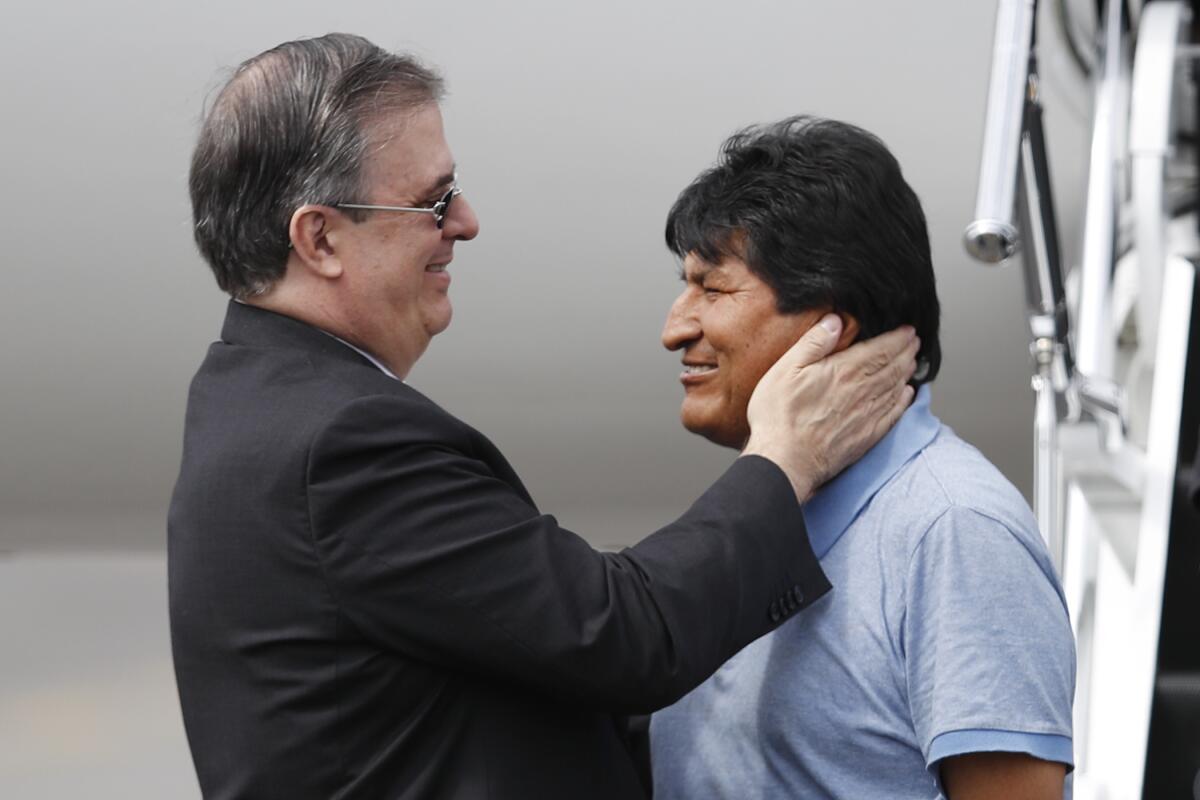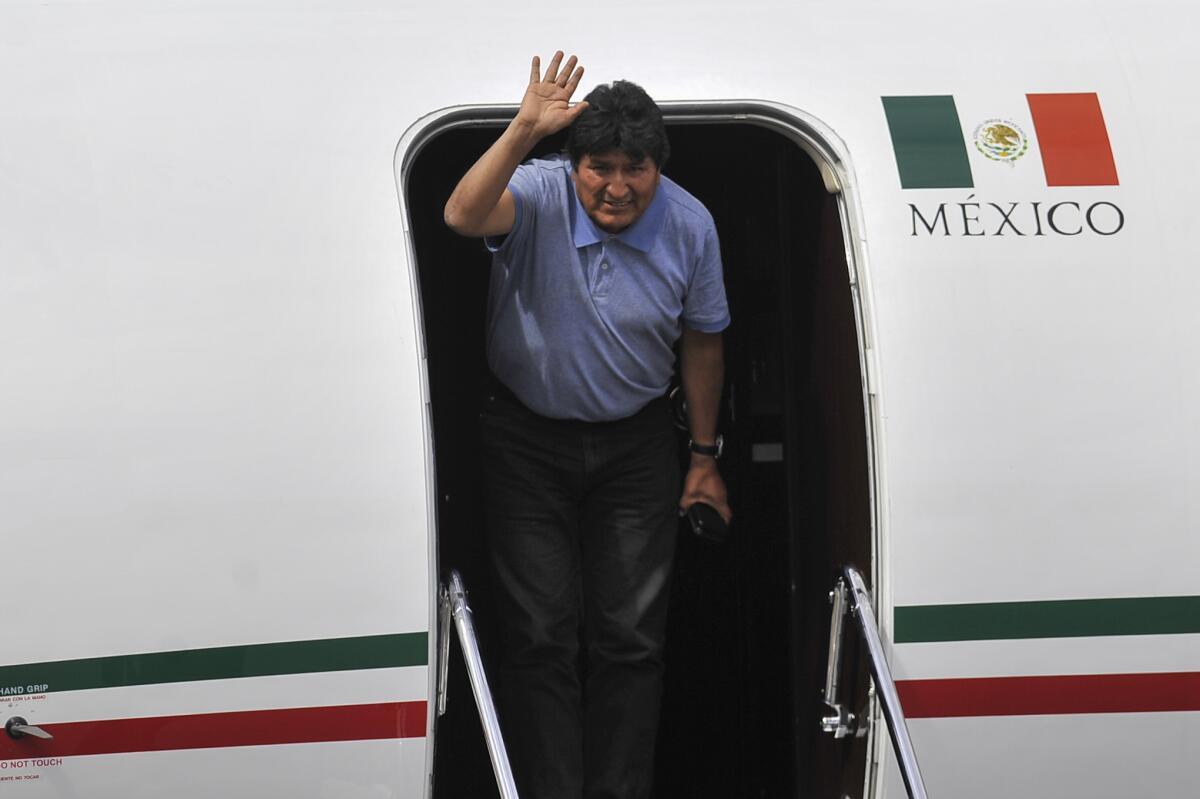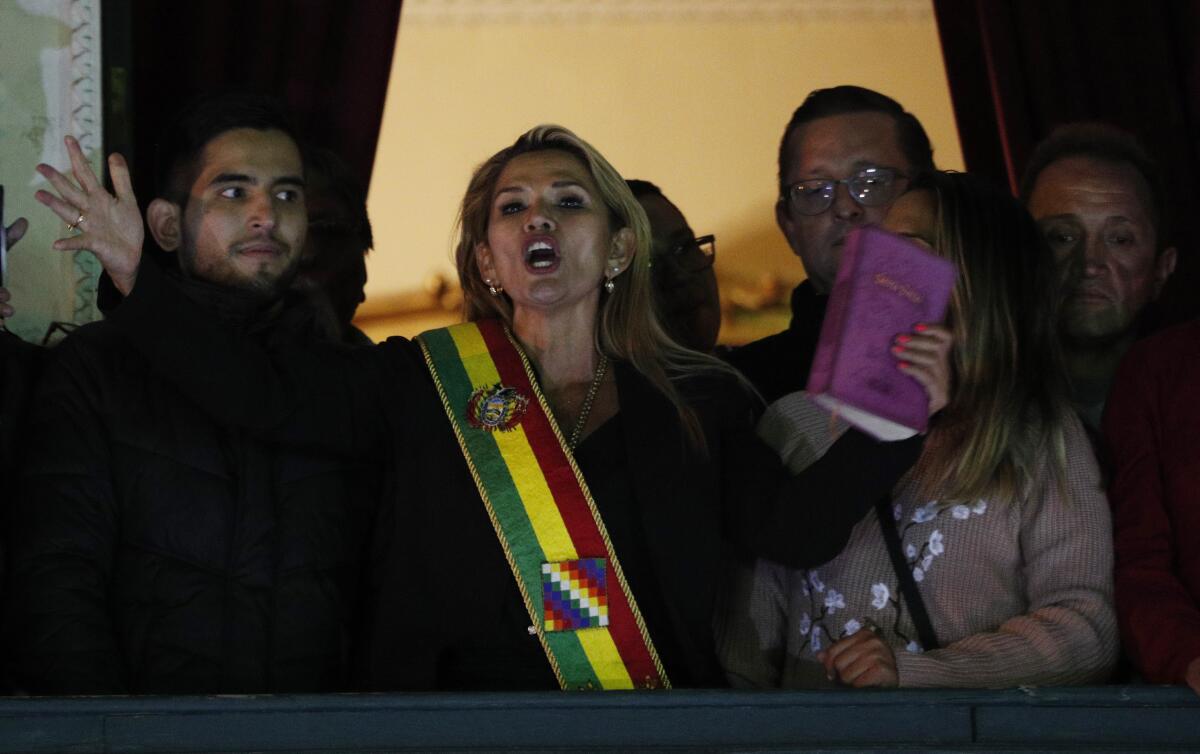As Morales arrives in Mexico, Bolivian opposition senator declares herself interim president

- Share via
MEXICO CITY — Former Bolivian President Evo Morales arrived Tuesday in Mexico, where authorities have granted him political asylum, as an opposition senator back in Bolivia declared herself interim president.
Emerging from a Mexican air force jet in Mexico City, Morales was met on the tarmac by Foreign Secretary Marcelo Ebrard, who embraced the man who has led Bolivia for almost 14 years.
Hours later in a meeting of Bolivian legislators, nobody from the Morales’ ruling party was present to object when Jeanine Añez promoted herself to the head of the Senate, a position that she said put her in line to be the country’s president, since both Morales and his vice president had resigned.
Añez, who said her priority was to call for new national elections, later hoisted a Bible in the air at the presidential residence in the capital, La Paz, and appeared on a balcony wearing the presidential sash.
No legal quorum of lawmakers approved her move, and she took no oath of office.
But the United States, which has long opposed Morales for his socialist policies, appeared to recognize Añez as interim president.
U.S. authorities “look forward to working” with Añez and other leaders in Bolivia “as they arrange free & fair elections as soon as possible,” Michael G. Kozak, acting assistant secretary for the State Department’s Bureau of Western Hemisphere Affairs, tweeted Tuesday evening.
Morales turned to Twitter to decry Añez’s claim to the presidency as “the most devious and evil coup in history.”
Upon arriving in Mexico earlier in the day, he thanked Mexican President Andres Manuel Lopez Obrador, saying that Mexico had saved his life after he received death threats in Bolivia.
In a short statement before reporters at the airport, Morales denounced violence in his homeland and declared that he would continue “the fight” for equality in Bolivia.

“Thanks to Mexico, to its authorities,” he said. “But I also want to tell you that as long as we are alive, we will continue in politics.... And we are sure that people have the right to liberate themselves.”
Morales, who is Bolivia’s first indigenous president, has pledged to return to Bolivia and declared that he was the victim of a coup.
Ebrard, the Mexican foreign secretary, also characterized Morales’ forced departure as a coup.
Morales resigned Sunday after the head of Bolivia’s army requested that he step down following weeks of protests over disputed national elections on Oct. 20.
Morales, seeking his fourth straight term, says he won. But critics, who argue that Morales had ambitions to be president for life, charged that the vote had been rigged, and a team from the Organization of American States found numerous irregularities in the balloting.
The former president dropped from public sight for a day before a Mexican military jet arrived in Bolivia on Monday to take him to Mexico.

Morales and an entourage of political allies arrived here shortly after 11 a.m. Tuesday following a circuitous route and a stop in Paraguay after several nations — including Peru and Ecuador — denied flyover or refueling rights, Ebrard said.
Street protests and clashes between Morales’ supporters and foes have rocked Bolivia since Sunday.
His resignation, along with those of his constitutionally designated successors, left the Andean nation of 11 million without a president.
Among those accompanying Morales to Mexico was the former vice president, Alvaro Garcia Linera, a longtime confidant.
Before Morales arrived here, the Mexican foreign secretary dismissed suggestions that Mexico’s decision to grant asylum to Morales — a longtime critic of U.S. “imperialism” — would elevate tensions with the United States.
“With the United States there is no tension; there may be differences,” Ebrard told reporters in Mexico City.
Lopez Obrador, who was elected last year as Mexico’s first declared leftist president in a generation, has sought cordial relations with the Trump administration.
The decision to grant asylum to Morales, Ebrard said, was in line with Mexico’s longtime practice of providing refuge to political dissidents — from Republicans fleeing the Spanish Civil War in the 1930s to Chileans escaping the military government of Gen. Augusto Pinochet during the 1970s and 1980s.
Among the celebrated exiles who have sought refuge in Mexico were Fidel Castro, who arrived here in 1955 after being jailed in Cuba, and Leon Trotsky, the Bolshevik revolutionary leader. In 1940, a Soviet agent assassinated Trotsky at his home here.
Mexican authorities vowed to ensure the safety of Morales, who was whisked away from the airport in a military helicopter.
Special correspondents Marcelo Tedesqui in La Paz and Cecilia Sanchez in Mexico City contributed to this report.
More to Read
Sign up for Essential California
The most important California stories and recommendations in your inbox every morning.
You may occasionally receive promotional content from the Los Angeles Times.










